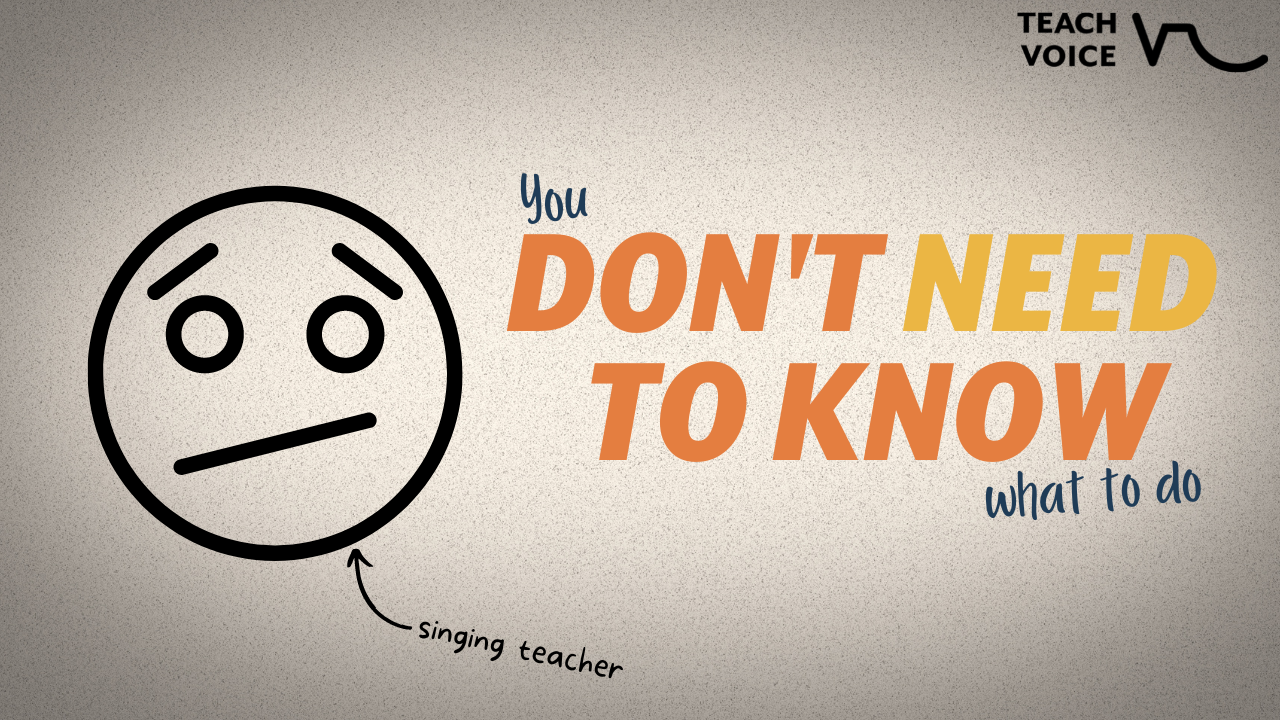Singing teachers... You don't NEED to know what to do!
Aug 12, 2022
I know, I know… it sounds a bit whack, but this is part of why the Teach Voice came to be. IE, from my passion to be able to help teachers build their intuition and skill through an actual process.
Now, I AM saying "you don't need to know what *said problem* sounds like", but I’m not suggesting you don’t use your ears at all when figuring stuff out.
Despite that, what does come up over and over again with the coaches I’ve worked with is this:
“I need to know what *insert problem* sounds like to even know what to do”.
IT takes TIME!
For the majority of teachers within the first few years of coaching (and a lot of the experienced ones too), being able to do this isn’t going to come quickly, because it comes with many hours and years of experience.
It is demoralising as an expectation, and you are putting pressure on yourself to be laser guided. Being too quick with a decision also risks being blinkered to a single outcome. Worse still, you might feel lost in the very first singing lesson with someone.
Not fun.
They don't always match up
Experience aside, there are other reasons why you don’t need to instantly know what something is to be able to really help. For example, it’s convenient to say *this sound* is directly related to *this problem*, but it’s very hit and miss as to whether you can really say that.
For example, there are many more reasons for airiness in a sound than just ‘needing more cord closure’. Coaches really need something to be able to test that when they encounter a voice that isn’t responding well to much.
In my experience of watching different schools approach this, the opinions are so varied between them that eventually teachers are more confused anyway. Then they end up talking to me!
Get comfortable now knowing!
In the way I create teacher training, I account for the messy way that humans learn and long lasting solutions are fleshed out. This involves assessing a bunch of different vocal 'functions' to build a clearer picture, then engaging in an exercise and letting it unfold the story more.
To do it this way, you have to be much more comfortable not knowing the answer right away, but confident that it will become clear to you the more you engage it through a process.
A different perspective
To give you an idea, there are noticeable things that might happen using body movement. Either an instant improvement or a sudden experience of difficulty. No matter what, they immediately build a picture that changes the initial thought about where the problem exists in the singers body.
For teachers who usually go straight for the vocal folds, they are always surprised at how movement highlights what actually ISN’T a vocal fold issue. In other words, using movement made sure we didn't try and fix something that wasn't broken!
I can’t tell you how often a quick diagnosis of 'too much chest’ is given because it sounds heavy, dark and cracks at G. But then, with a little more structured 'prodding', we often find out that chest voice ISN'T behaving in the way chest usually does. Even though it really sounds like chest, it was lacking some key characteristics, and hence why things haven’t been improving.
So, instead of expecting ourselves to just know what it is, we can pull on more knowledge of register behaviour, how they interact with breath, resonance, physical movement and the singers aesthetic desires. Looking wider like this, we can then take on the problem with more objective information and avoid a duff turn from the start.
THEN you will have experience of what it sounds like. Next time you hear something similar, you’ll absolutely be a lot quicker.
Building Intuition
Within my ‘Evolve’ teacher training course, we talk about building this kind of intuition in a specific way. We of course listen to audio examples of singers and training pathways in the various modules. This is especially true in acoustics.
There are also twice weekly opportunities to observe stuff live within a group, and an archive of recordings to keep the ear building.
So, if you feel stuck with this or just want to learn more about the Evolve Teacher Training course, please get in touch with us or book a free consultation to talk things through.
Want to become a master problem solver?
Our 'Evolve' Teacher Training Course could be just what you need to take your teaching to a new level.
Book your free discovery call and let's talk!
Stay connected with news and updates!
Join our mailing list to receive the latest news and updates from our team.
Don't worry, your information will not be shared.
We hate SPAM. We will never sell your information, for any reason.
